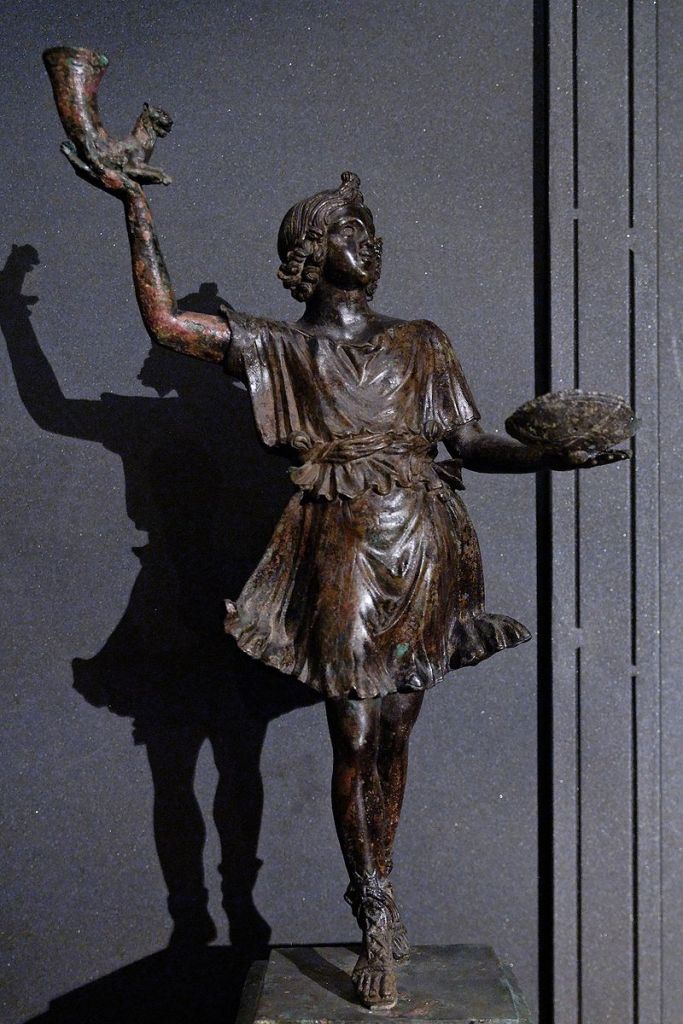Lares
The Lares, ever-watchful spirits in Roman religion, served as guardians of households, crossroads, and even the entire city. These venerated spirits were believed to be ancestral in nature, keeping a benevolent eye on families and ensuring their prosperity.

Parents: Mercury and Larunda
Festivals: Compitalia
The Lares were omnipresent protectors. These watchful spirits observed, influenced, and safeguarded everything within their domain. In Roman households, Lares statues found a place of honor at the family table during meals, a constant reminder of their presence. Their blessings were believed to be essential for all significant family events. But the Lares’ influence stretched far beyond the hearth. Road travelers, sailors navigating treacherous waters, and farmers tending their crops all looked to the Lares for protection. Even towns, cities, the Roman state itself, and its mighty military found themselves under the watchful gaze of specific Lares.
Domains
Their influence reached far and wide, as reflected in their numerous epithets:
- Guardians of the Home and Family: The Lares Domestici (Lares of the House) and Lares Familiares (Lares of the Family) were likely the same, venerated spirits who watched over the household and its inhabitants. Meals shared with family often included a symbolic place setting for the Lares, acknowledging their presence and seeking their blessings.
- Protectors of the Community: Beyond individual families, the Lares extended their watchful gaze to neighborhoods and towns. The Lares Compitales presided over crossroads, serving as focal points for religious and social life, especially for the common people.
- State and Military Guardians: The Roman state itself, along with its mighty military, wasn’t without Lares. The Lar Militaris safeguarded the military, while the Lares Praestites protected the city of Rome, potentially even functioning as the neighborhood Lares for the emperor Augustus. Lares Patrii (Lares of the Fathers) might have been another aspect related to the state’s well-being.
- Lares for Specific Needs: Travelers on land and sea sought the protection of the Lares Viales (Lares of Roads) and the Lares Permarini (Lares of the Sea) respectively. Lares Rurales watched over fields and agricultural endeavors, while the enigmatic Lares Grundules were supposedly honored for a specific historical event. Lares Privati might have been a more general term for Lares protecting private individuals or spaces.

Lararium
By the early Roman Empire, household shrines dedicated to the Lares were commonly called lararia. These lararia almost always housed at least one Lares statue, reflecting the importance of these guardian spirits in Roman homes. Evidence from Pompeii offers fascinating insights into these domestic sanctuaries.

Paintings uncovered in Pompeii depict lararia featuring a central trio: two Lares flanking a Genius figure. The Genius, dressed in a toga like a priest performing a sacrifice, symbolizes the household’s protective spirit. Beneath this trio, a winding serpent represents fertility and generative power, slithering towards a small altar. Scattered around the scene are the tools needed for offerings: bowls, knives, incense boxes, vessels for libations, and even hints of sacrificed animal parts. These depictions provide a window into the rituals performed at the lararium, a sacred space within the Roman home.
For those of more modest means, elaborate shrines weren’t necessary. Simple lararia could consist of small Lar statues placed in niches carved directly into the walls. In some cases, a simple tile shelf protruding from a painted background might suffice as a place of honor for these cherished household protectors.

